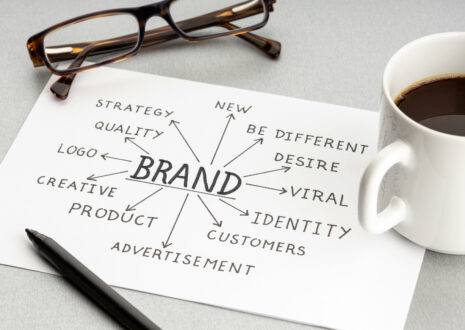Do you and your employees have a clear vision of your core values in the form of a refined business philosophy and mission statement?
Better yet, are you and your employees aligned with them? Motivated and geared towards the same goals?
If not, then your team may be falling short of being effective with your time. Also, you might even be working in a toxic work culture, or, even, failing to create a brand that truly connects with others.
A business’s brand philosophy is focused around the ideas that govern your company’s ethics, objectives and vision. And a great one aligns all these with your branding, product design and marketing.
But the question is — where do you start?
For some inspiration, take a look below at some award-winning business philosophy examples from world-famous companies.
Here’s what we’ll cover:
10 Brand Philosophies To Refine Your Business Strategy
The brand philosophy of a company provides the blueprint for all employees to unite under and follow.
Here are some of the top examples of companies that clearly envision and communicate their business philosophy internally and to their customers.
Inspiring Business Philosophy Examples
- Google
- Chanel
- Nike
- Alexander McQueen
- Apple
- Starbucks
- Sennheiser
- Dove
- Warby Parker
- Title Boxing
- Chanel
- Nike
- Alexander McQueen
- Apple
- Starbucks
- Sennheiser
- Dove
- Warby Parker
- Title Boxing
1. Google

When it comes to FAQ design, the clearer and simpler the questions, the better. Customers use the FAQ page to quickly find the answers to their burning questions. The less time spent browsing and searching, the less likely they’ll be frustrated. The more likely they’ll stay and make a purchase, increasing your customer conversion rate and brand value.
If your questions are long-winded and unclear, it defeats the purpose of having a FAQ in the first place.
Questions worded plainly provide the customer with the fastest avenue to finding an answer and might even help them find questions that they didn’t even know they had.
A good example of this is Twitter. They include clear and simple questions, with different topics split up into smaller questions.
2. Chanel

It can be difficult to make a lasting impression in an industry as fickle (and as saturated) as in fashion. Chanel, however, has stood the test of time. Founded in 1909, Chanel is synonymous with sophistication and liberation. Fashion designer, Coco Chanel, began her business in the post-World War I era with the philosophy of liberating women from the restrictions of corsets and bustles. Her clothes emphasized comfort and fashion simultaneously.
Even though Coco Chanel, the brand’s founder, is long gone, her niches continue to spearhead the business’s purpose in providing stylish clothing for the respectable woman. Coco Chanel’s passion for striking visual motifs and unique aesthetics is still being carried out by their equally passionate team.
3. Nike

Nike’s co-founder, Bill Bowerman, started out as a track and field coach. Dissatisfied with the available leather and metal running spikes, Bowerman did all he could to design running shoes that would help athletes reduce their times.
But, more than this, it is Bowerman who helped defined Nike’s ultimate mission statement. By adding an asterisk to the original idea of bringing “inspiration and innovation to every athlete in the world,” Bowerman forwarded the idea that, “If you have a body, you are an athlete.”
It is this sentiment that has opened Nike up to just about everyone. Its inclusive values add warmth and help humanise a brand that would otherwise exclude an entire chunk of the population.
Today, their products, reiterates their core notion by implementing inclusive promotional designs such as plus-sized mannequins and accommodating practical designs such as soles that support prosthetic legs whilst running.
4. Alexander McQueen

Alexander McQueen’s fashion house is known for his dark and dramatic designs consisting of violent and grotesque elements.
The late McQueen was renowened for artistic genius, brimming with unique designs thats often were controversial (the 1995 show titled, “Highland Rape” springs to mind). McQueen worked closely with Sarah Burton and together they shaped his philosophy of producing high-quality and luxurious garments that pushed the envelope.
These 2 figures, both iconic figures in the fashion world, generate trust and reliability through their respective legacies.
In a similar vein, the brand’s philosophy which advocates shock and glamour has been consistently reiterated over the years using celebrities and public figures to endorse the garments. Burton famously designed the Duchess of Cambridge’s wedding dress, whilst McQueen himself was often photographed styling the likes of Sarah Jessica Parker and Lady Gaga.
5. Apple

From 1997 to 2002, Apple fronted their ‘Think Different’ campaign. What are the implications behind this? Thinking differently represents out-of-the-box, intelligent, and creative modes of operation. Even though the actual advertising campaign is no longer running, ‘Think Different’ is a business philosophy example that has permeated throughout the brand over the years.
From the sleek retail stores fronted by smart-casual tee-shirt-wearing staff, to their cool and trendy co-founder (the late Steve Jobs).
Apple has always sought to represent an ethos which is ground-breaking in its genius, yet relaxed and accessible for the everyday person. It’s a philosophy which translates well into their product design.
Revolutionizing the mobile phone industry through the original iPhone and continuing to innovate, everything about the company oozes “Think Different.”
6. Starbucks

These days, it seems like there’s a Starbucks on almost every street corner around the world. Taking Starbuck’s brand philosophy into account, it’s no wonder there are so many coffee shops conveniently situated at every community intersection.
Starbucks brand philosophy is community driven. Their goal of inspiring and nurturing the human spirit one person, one cup and one neighborhood at a time is made apparent through their actual stores.
Each Starbucks as a hub for the communities that they serve, establishing close ties with the customers in each unique locale.
Starbucks does not allow its stores to be franchised. Instead, store locations and design are decided at corporate.
Starbucks CEO Howard Schultz had this to say about the decision: “We believed very early on that people’s interaction with the Starbucks experience was going to determine the success of the brand.” This brand philosophy example is executed not just on the local or regional level, but at the executive level as well.
7. Sennheiser

“We have a vision,” states the Sennheiser website. “We are shaping today the audio world of tomorrow – that is the ambition that we and our company live by from day to day.”
No matter the industry or purpose, the speaker and headphones giant’s philosophy describes a culture of innovation and adaptation. Sennheiser is all about technological upheaval and this is communicated in its brand philosophy and in its actions.
According to Sennheiser, the name represents the establishment and development of trends. Their company culture is designed to be adaptive and responsive to quick changes in consumer preferences.
There have been many ground-breaking innovations – developing the first directional microphone in the 50s, the first open headphone design in the 60s and infrared transmission technology in the 80s.
Evidently, this lines up with the business philosophy and customers have learnt to associate these qualities with the brand.
8. Dove

Soap and toiletries company, Dove, centers their brand philosophy around “real beauty.” As a brand philosophy example, Dove shines as an all inclusive one, and this philosophy is extended throughout their business practices.
Instead of using models, Dove insists on asking every-day women to display and model their products. Their goal is to shatter rigid, harmful beauty stereotypes while helping young women and girls overcome anxiety and insecurity about their self-image.
Dove’s brand philosophy states that beauty should be a source of confidence, not anxiety. It endorses a plurality of different beauty standards to achieve this end.
Not only does Dove encourage others to love themselves. It also drives consumers to feel like their unique beauty standards are being recognized and addressed.
9. Warby Parker

Warby Parker began with a group of students resolving the lack of access to affordable and good glasses. Their goal is to offer fashion forward, designer eyewear at affordable prices while helping others gain accessibility to vision.
This brand philosophy example translates mission statement into practice. To lower costs, they use plant-based cellulose acetate while assembling and polishing their frames by hand to give it that premium finish. To deliver on their vision of increasing vision accessibility, Warby Parker pays it forward by distributing a free pair of glasses to someone in need – talk about an eye for an eye!
10. Title Boxing

This is another sports and fitness brand that follows the trend of increasing inclusivity and accessibility for its consumers. They don’t only focus on professional athletes and fighters, they also cater to amateur boxers as well. One of the main beliefs is that the brand will help everyone in reaching their goals, whatever they may be.
Whether that’s through apparel, boxing gloves, fitness equipment or punching bags, Title Boxing has created a connection between creating champions and their products.
Beyond their fighting equipment and apparel, they also have an abundance of clubs, facilities and organizations that consumers can participate in and obtain coaching from.
In doing so, the brand positions themselves as mentors and helpers and not the boxing stars of the show.
Key Takeaways
To compose your own brand philosophy, you’ll need to consider your core principles:
- Consider the nature of your business, your unique selling point, who your audience is, and what your goals are.
- When you’ve figured this out, you’ll need to maintain and elevate it; this philosophy needs to be constant and consistent, and something that everyone on your team can advocate and believe in. This can be easier said than done but, as the brand philosophy examples have shown, it’s certainly doable and is a sure-fire recipe for success.
- Create a story between your product and service and your philosophy. What drove you to create your business in the first place? What ideas represent the essence of your brand? These questions will help you define your brand philosophy and create a narration.




